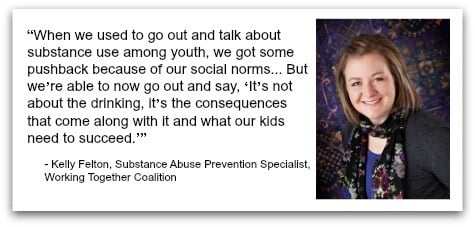Blog
Drug Free Communities: Tackling Norms Around Kids and Substance Use
A community can’t reduce youth substance abuse if parents don’t see it as a problem. That was the issue faced by Substance Abuse Prevention Specialist Kelly Felton in northern Minnesota.
Ms. Felton and her colleagues in the Working Together Coalition (WTC) use the 40 Developmental Assets® as a nonjudgmental model to educate parents and other adults on the benefits of avoiding alcohol and other drugs for young people.
Formed in 1999, the Working Together Coalition is a group of youth, parents, and community leaders from ten northern Minnesota communities that work to reduce substance use in their young people—with a specific emphasis on alcohol. To do this, the coalition has aimed to change the norm in the community around kids and drinking.
The coalition received a Drug Free Communities (DFC) grant four years ago to expand their prevention efforts. One requirement of a DFC grantee is to collect data on the Four Core Measures, which are
- Past 30-Day Use: The percentage of respondents who report using alcohol, tobacco, or marijuana at least ONCE in the past 30 days
- Average Age of Onset: The average age that respondents report first trying alcohol, tobacco, or marijuana
- Perception of Risk: The percentage of respondents who report that regular use of alcohol, tobacco, or marijuana has moderate risk or great risk
- Perception of Parental Disapproval: The percentage of respondents who report their parents feel regular use of alcohol is wrong or very wrong and ANY use of cigarettes or marijuana is wrong or very wrong
WTC chose to use Search Institute’s Attitudes and Behaviors Survey (A&B) because it fulfills these DFC measurement requirements.
After getting their data back, the coalition found that the A&B did much more than just fulfill a grant requirement. “Our coalition members, including myself, really loved the way it was simple and it made sense to everybody,” says Ms. Felton of the survey results. “The survey allowed us to change the way that we talked about our work. That’s when we saw our framework align with the 40 Assets.”

Incorporating the Developmental Assets into the coalition’s work has helped them educate parents and other adults on the fact that underage drinking is not a normal part of growing up. “When we used to go out and talk about substance use among youth, we got some pushback because of our social norms,” explains Ms. Felton. “People would say, ‘Kelly, I did it when I was a kid; it’s not a big deal.’ Do I still get that? Of course I do, because that’s our norm. But we’re able to now go out and say, ‘It’s not about the drinking, it’s the consequences that come along with it and what our kids need to succeed.’”
Ms. Felton points out that talking about adult behavior can be a sensitive subject. “It’s different than talking about youth. This is why we’re trying to take the positive approach, which is so easy when using the assets framework,” she says. Their latest initiative promotes the need for positive adult role models for the young people in their community. Using data from their most recent A&B Survey, WTC can point out that their young people are only in the 20th percentile for positive adult role models. When people in the community hear that, they want to make a change.
WTC now administers the A&B every year to all sixth through twelve grade students in all ten communities. As Ms. Felton explains of the survey, “It allows us to get a snapshot of what’s going on with our kids, to really identify our local conditions, and what’s making our kids choose to use substances, rather than abstain from them.” The coalition uses this snapshot to tweak their approach to prevention and revamp their strategies.
When asked what the future has in store for WTC, Ms. Felton says, “We’re going to continue supporting our kids using the 40 Assets and the A&B Survey. We will keep talking to our youth and understanding the challenges that they’re facing.” Ultimately, the Working Together Coalition will keep the focus on helping the community thrive in the years to come.
